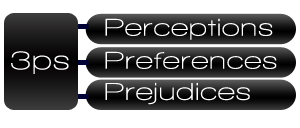Will Your Employer Stand Behind You?
Sales will continue to be a difficult, but rewarding position. We have had an opportunity to cover issues regarding the Black sales professional, the customer, and the employer, and their interactions in the course of business. This is a complex relationship.
The effects of the 3Ps often have a role in the relationship. For a refresher, the 3Ps play into the relationship in varying degrees; sometimes just below the surface, and sometimes playing a much more prominent role. Today we will cover the reaction of the employer when prejudice rears its ugly head in the customer relationship, and how you might be affected.
The 3Ps Revisited
The 3Ps represent the untold in the workplace, beliefs, attitudes, and practices that can make it more difficult to succeed. I will draw from the Inaugural Post of Black Sales Journal 11/2010, when they were first discussed. Specifically, I termed it the “X” factor.
The 3Ps are:
- Perceptions
- Preferences
- Prejudices
Perceptions are hard to change, yet they are based on ones background, mindset, and their seat in the arena of life.
Preferences, quite simply, are what a person leans toward in their relationships, where their comfort level lies.
Prejudices are deep, often fueled by perceptions and one’s past, are deep enough to be actionable and problematic.
We went on to talk about the effect of these on your customer in Black Sales Journal – Preference, Prejudice, Perceptions and Your Customer) . This post covered how you can work with your customer when one or all of the 3Ps are evident.
The most striking statement in the post was that of the elements of the 3Ps, the most insidious is Prejudice. It is the most problematic of the 3Ps, mainly because there is little that can be done about it. Take a moment to review The Inaugural Post of Black Sales Journal and you will see that when it comes to the customer and the 3Ps, prejudice has little or no solutions.
When Prejudice Rears Its Ugly Head
There is always a possibility that a new sales relationship can go south because of Prejudice and its effects. When and if things go wrong, you will be faced with being in a ‘sandwich’ between an employer who wants to satisfy a customer, continue to reap revenue, and hopefully, wants to support their sales professional.
Your employer’s reactions will obviously be affected by his or her own 3Ps, and you should expect that will be a factor (Black Sales Journal 12/30/2011 Preference, Perceptions, Prejudice, and Your Employer). As a matter of fact, Prejudice sometimes is unmasked when customers and prospects are handed out to a Black sales professional. No one has an idea of how receptive the customer will be to the new relationship unless the customer has made statements or taken actions that reveal it. I would rather see this distribution of business to the Black sales representative than have the employer avoid giving them the best prospects to others in anticipation of a negative response.
When the customer reacts unfavorably, you will get an education, as you will get an opportunity to see whether your employer stands behind you.
An Real Example
I was a Black sales representative in B2B sales who was assigned an account to service and hopefully sell additional business. I was more than willing to accept, and take a chance on, any reassigned account, as it was a way to increase sales revenue. I needed the account badly.
The account was medium in size, and although complicated, well within my capabilities as a sales representative. After much preparation I made my first visit to the account to make my introduction and discuss a change in pricing on the account. My sales manager accompanied me on the call as making changing pricing at that time was a touchy issue.
After the introduction it was obvious that the call was not going to be warm and fuzzy. The customer, who was an older individual, sat motionless with a foul expression even before the increase in price was discussed. Once pricing was discussed, the customer slammed his hand down on the desk “This is bull _ _ _ _ , you are trying to put me out of business!”. “I will not accept this! Get the hell out of my office!” he ranted. We made a feeble attempt to explain the pricing but were told again to “Get out now!”
We gathered our materials and made a hasty retreat. The buyer followed us through the open office, full of his employees, ranting at us.
On our drive back to the office, my manager and I discussed the call and it was obvious that neither of us expected the reaction, price increases were happening everywhere and ours was modest compared to others.
Upon arriving at the office the Regional Sales Manager (my sales managers boss) called me to discuss. The customer had called him and advised that he was ticked and that they were going to move their business if a change was not made. I told the Regional Sales Manager that I had done everything possible on the pricing. He said to me “It is not the pricing that he wants to change, he wants you off of the account. He advised that he was not going to work with you based on your race.” I knew from the conversation that he was sparing me the actual comments made.
Then came a statement that changed my life. He indicated that he told the account that if that is the way you feel, “He is our sales representative, and if you work with us, you will work with Michael. If not, we will, at your suggestion, terminate your account.” The account ‘fired us’ later that day he indicated that he was moving his business and never would return.
It was a modest loss of business for my company but a huge boost in my confidence. My company had stood behind me! Quite frankly, I appreciate what the sales manager did and I will never forget it. There is no greater endorsement of a professional than to have the support of their employer.
Conclusion
I know that this example is unlike others, yet in backing a business resource, a devoted employee, I tend to think that the employer made out well.
Every situation and every company are different. When I managed sales professionals, my actions had a sympathy to the sales professional involved as well as the customer.
Lesson learned: Customers are always important, but the customer is not always right!
We appreciate your responses.
 March 17, 2011
|
Posted by Admin9!
March 17, 2011
|
Posted by Admin9!


 Categories:
Categories:  Tags:
Tags: 
Your Comments